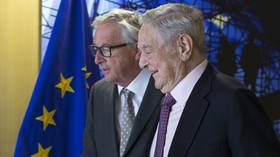Collapse of EU superstate? Euroskeptics could paralyze Brussels after May elections – study
Anti-EU parties are set to gain a third of European parliamentary votes in May, a new study says. Analysts warn it may bring down the whole political system in Europe, leaving Brussels powerless.
The European Council on Foreign Relations (ECFR) report describes the vote as "the most consequential parliamentary vote in the EU's history" and says it is even possible for Euroskeptic parties to gain more than 30 percent of the EP's seats "if their popularity continues to grow or if some of the fringe members of the mainstream join them."
The report argues that if such a situation occurs, the EU could find itself "living on borrowed time" and outlines ways that various anti-EU parties could align with each other to garner more power in Brussels.
'Too little, too late'
The shaky situation in Europe is the result of the EU "trying to get rid of nationhood" and the fact that EU institutions are "too remote from the individual citizens," Jon Gaunt, a UK radio host, journalist and political commentator, told RT. That point was also reflected in the report which acknowledged that anti-EU parties are advocating a return to a "Europe of the nations" instead of what Gaunt described as a "non-democratic superstate."
If anti-establishment parties gain more influence in EU politics, they could defuse arguments made by pro-EU parties that the project is "imperfect but capable of reform," the report said.
Despite the rapid rise of anti-establishment parties, the report claims that the "silent majority" across Europe are still pro-EU. Gaunt believes, however, saying that the EU project is at "the beginning of the end" and efforts by pro-EU parties to reform the bloc are "too little, too late."
‘Crisis of confidence’
While the report generally takes the view that Europeans still mostly “believe in and associate with” the EU project, it accepts that the status quo cannot simply be defended and that movements like the Yellow Vests in France have demonstrated that ordinary people “see no link” between what happens in the corridors of power and the issues they personally care about.
One of those who echoes that view is Laszlo Maracz, a European Studies professor and humanities researcher at University of Amsterdam, who told RT that the mass protest movement in France reflects that the EU project is experiencing a “very deep crisis in confidence” which could lead some countries to “the brink of political meltdown” and France in particular could enter into some “revolutionary state of affairs.”
Just published: Our latest report finds that anti-European parties are on course to win the third of seats in @Europarl_EN#EUelections2019 necessary to paralyse the #EU: https://t.co/0fcQFpSch1@sd270@PawelZerka@ECFRPowerpic.twitter.com/2ZCYXsOGof
— ECFR (@ecfr) February 11, 2019
As for how to solve the multiple crises facing Europe, it’s not a one-size-fits-all, Maracz said, noting that regional, national and individual differences exist across Europe and that there is not “one recipe” to fix the “extremely complex” situation.
The report, however, takes a dismissive tone against these increasingly popular parties and anti-EU sentiment, framing them as groups who want to “wreck Europe” and giving the impression that status quo powers have more right to exert influence in Europe — the kind of attitude which led the EU to its current crisis in the first place.
‘Fighting back’
The authors of the EU report offer various strategies for pro-European forces to “fight back” against euroskepticism. One of those strategies is to “drive a wedge” between anti-EU parties in an effort to prevent them from working together. Another strategy is to make the argument that “anti-Europeans”are“doing the job of the Kremlin”— a tactic which is an increasingly popular tool of establishment parties across the Western world.
Russian interference in the May elections is “highly likely” and “love of Russia” and “hatred of sanctions” is something that could unite the far left and far right, the report argues. With enough power, one of the biggest fears is that these parties could “compromise the EU’s common foreign policy on Russia.”
Also on rt.com ‘Long live Europe?’ Macron says only Franco-German union may stop global ‘chaos’In terms of how anti-EU parties could cooperate, various options are outlined including a potential “die-hard anti-EU coalitions of only the far right.” There is also the possibility of an “all against the establishment” alliance of the far right, Euroskeptics, and the far left, which could make life “very difficult” for pro-EU forces — although the authors see this scenario as less likely.
“Europe is in crisis and the crisis has not been caused by Euroskeptic parties,” Maracz said. “It’s caused by those people who have responsibility for political decision making now.”
Like this story? Share it with a friend!















